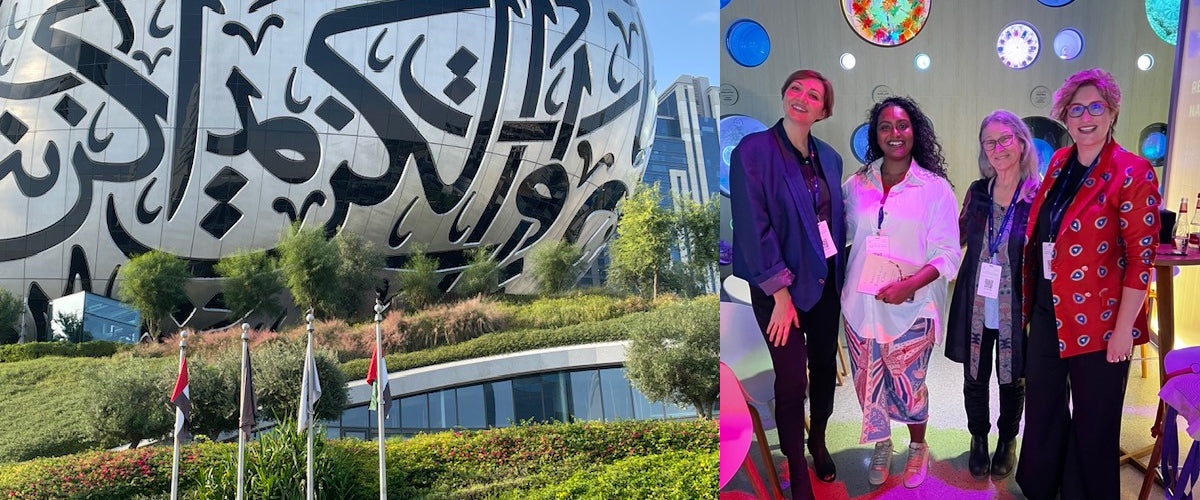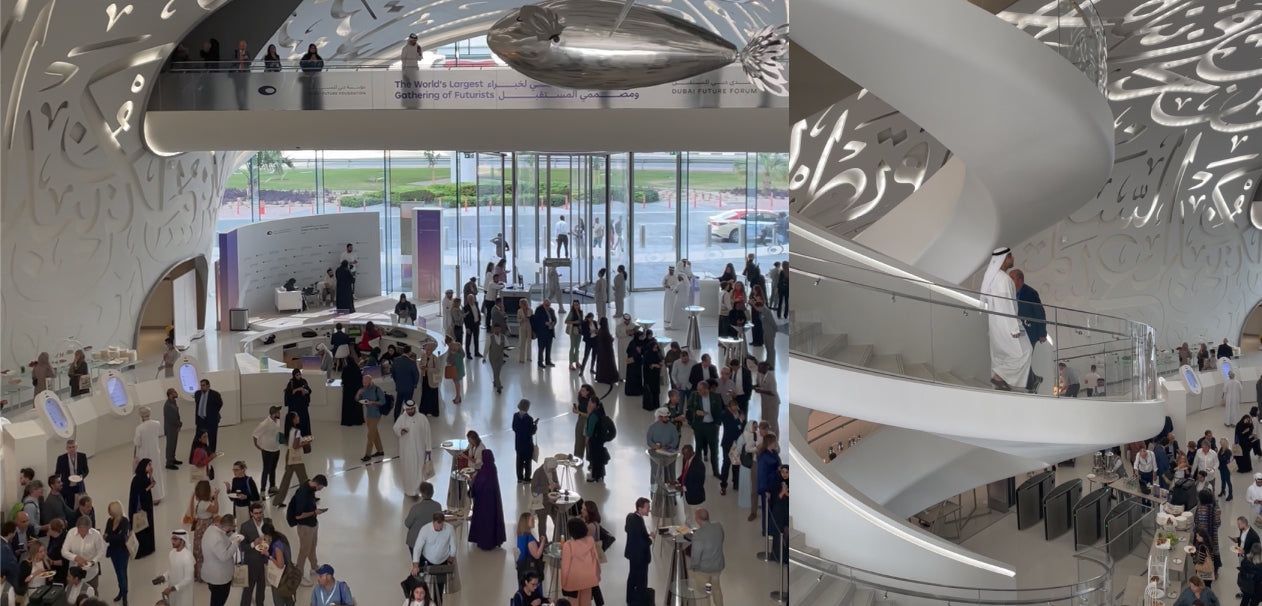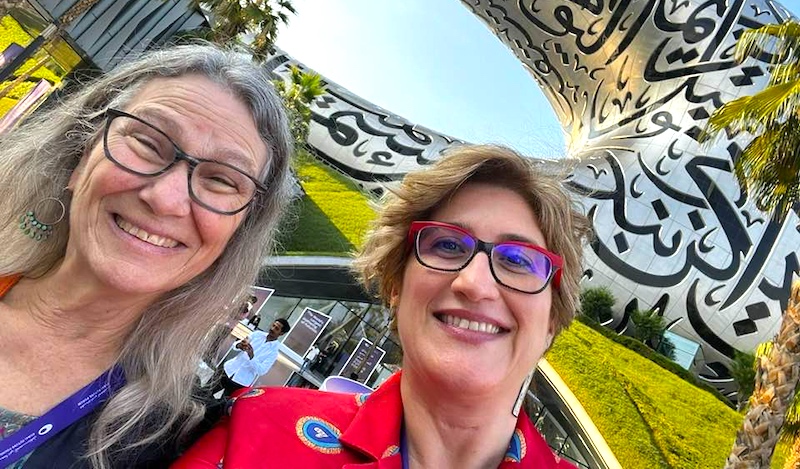
Guest Essay: A Soil Nerd Walks Into a Roomful of Futurists
If you saw headlines about a recent gathering in Dubai with the indecipherable acronym of COP and, like me, wondered what the heck it was and if you should care, then read this personal report from Portland's self-described "soil nerd," Kristin Ohlson, author of "The Soil Will Save Us" and "Sweet in Tooth and Claw."
Over 97,000 people convened in Dubai this December for the twenty-eighth Congress of Parties (COP)—the United Nations’ annual conference on climate change. A much smaller segment of the world’s eyes were on Dubai for a gathering which preceded the COP by a few days and involved at least a handful of the same people: the Dubai Future Forum, billed as “the world’s largest gathering of futurists.”
Amazingly—or at least, amazing to me—I was invited to speak at the forum. I had received a request to connect on LinkedIn from someone with the Dubai Future Foundation months ago, and even though this seemed like yet another request from someone whose interests seemed so different from mine that I hesitated to make the connection, I accepted. Further communication led to a phone call.
The forum would have four themes: Empowering Generations, Transcending Collaboration, Transforming Humanity, and Regenerating Nature. The director of the Dubai Museum of the Future had read my book, "The Soil Will Save Us," and the committee putting the gathering together wanted me to speak on one of the regeneration panels. I’m not exactly a Luddite but I certainly don’t consider myself a futurist—unless one who alternately hopes and panics about the future is a futurist, which probably describes all of us—but I’ll go anywhere to talk about regeneration and healthy ecosystems. They had told me that around 2,500 people would come, many from that region and that they were also flying in thinkers and doers from around the world.
 And indeed they did! I’ve never been at a gathering as truly diverse as this one—people young and older, from just about every part of the world, of every hue, and dozens of nationalities. Lucky for me, all speaking English albeit with the chiaroscuro of both their first language and the accent of whoever schooled them in English.
And indeed they did! I’ve never been at a gathering as truly diverse as this one—people young and older, from just about every part of the world, of every hue, and dozens of nationalities. Lucky for me, all speaking English albeit with the chiaroscuro of both their first language and the accent of whoever schooled them in English.
The reality of a conference like this is that you can’t get to everything, especially if you’re a speaker who’s a little nervous about being there to begin with. I managed to get to several of the regeneration panels, which were held in a dimly gorgeous room inside the Museum of the Future with walls that glowed with images of various life forms. In one panel, people talked about tapping indigenous wisdom to prepare for the future; in another, panelists talked about what might lie beyond Net Zero carbon emissions; in another, they talked about city planning that centers nature.
On my own panel, my co-panelists, Nithiya Laila, who works on biodiverse diets and equitable food systems in Singapore; Christine Gould, who supports science-and-technology-based startups through Thought for Food based in Switzerland; and our moderator, Dionysia Angeliki Lyra from the International Center for Biosaline Agriculture in Dubai and I spent an animated 45 minutes talking about soil, seeds, native plants and feeding the world’s people.
 I certainly wasn’t the only person among the 2,500 futurists who centers on healthy ecosystems—including healthy, prosperous humans, of course—but it’s also true that many of the panels and discussions at the conference were about shiny new things. Shiny new tools, shiny new technologies, shiny new approaches to problems. I told anyone who would listen that I’m not opposed to the new and shiny—unless those innovations are aimed at hacking the natural world for the convenience of humans.
I certainly wasn’t the only person among the 2,500 futurists who centers on healthy ecosystems—including healthy, prosperous humans, of course—but it’s also true that many of the panels and discussions at the conference were about shiny new things. Shiny new tools, shiny new technologies, shiny new approaches to problems. I told anyone who would listen that I’m not opposed to the new and shiny—unless those innovations are aimed at hacking the natural world for the convenience of humans.
Yes, new technology for benign sources of energy, please! New technology to turn my gas-powered car into an electric one! New technology for mining the mountains of garbage we’ve created to obtain the resources for future products! New ideas for our homes and cities! New science to parse the dazzling and essential complexity of the natural world and—this is the issue for me--to help us figure out how we can hack our own behavior so that both we and the rest of nature thrive.
Because life is so precious and—given what we know so far—unique. One of the early presentations at the Dubai Future Forum was a panel of astronauts talking about life on the space station. They talked about how they dealt with the conundrums of ordinary life while living in space—eating, getting enough exercise, staying in touch with loved ones—and agreed, sweetly, that one of the best things about the experience was the brotherly bond they now have with each other.
I couldn’t help but think of our marvelous planet as I listened to them. Scientists have searched through the samples brought back from space, hoping to find evidence of life. It’s not there. I have more life under my little fingernail after digging in the soil than has been found in all our extraplanetary explorations. We have to treasure life on Earth, respect that life, and change ourselves so that those coming next will also experience its beauty and abundance. Imagine if our collective aspiration for the future was to be good ancestors.
Watch a video of the presentation here.
Top photo: The Museum of the Future in Dubai, United Arab Emirates (l); presenters (left to right) Christine Gould, Nithiya Laila, Kristin Ohlson and Dionysia Angeliki Lyra. This essay was originally published at SoilCentric.
